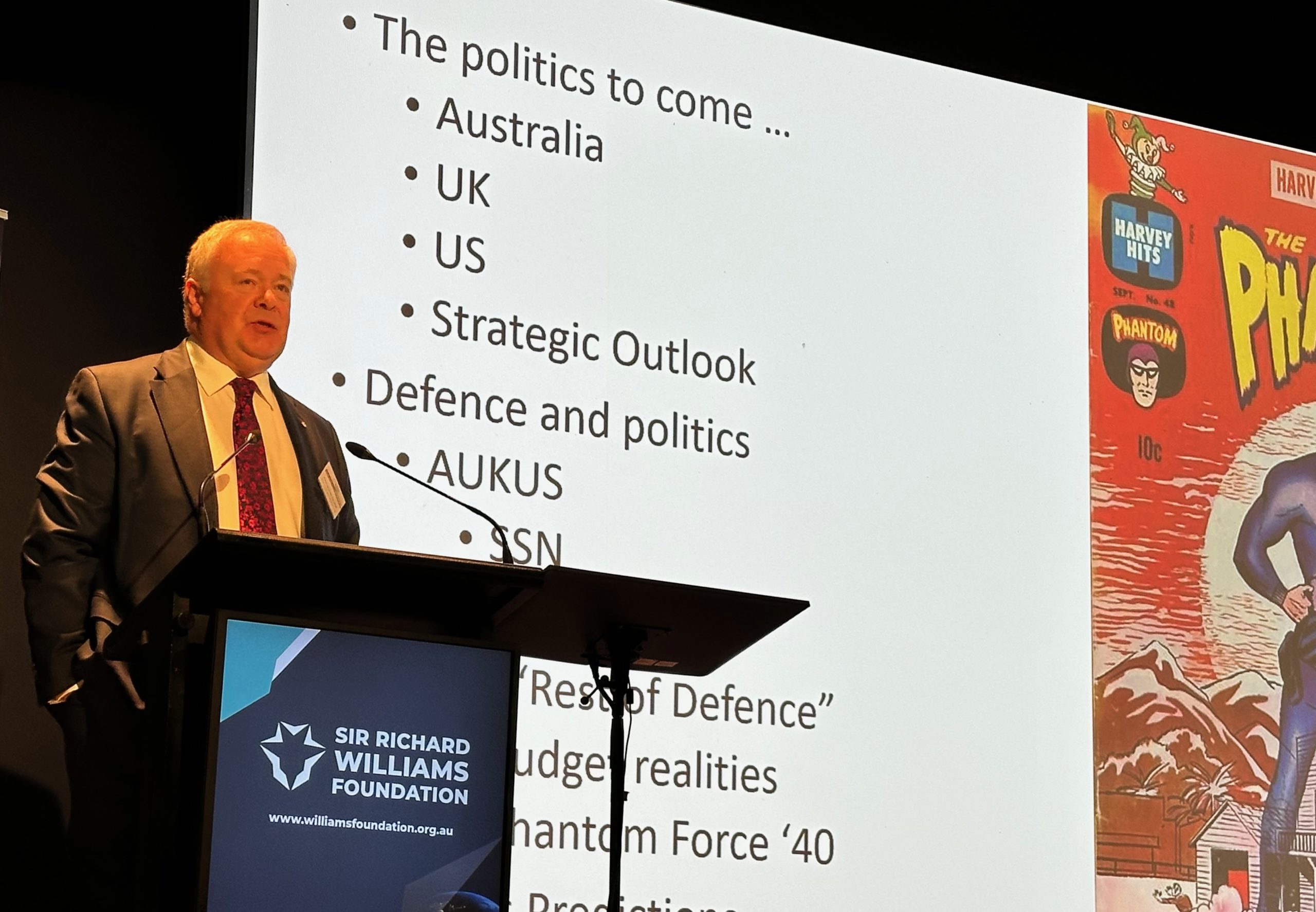









As Australia marks the third anniversary of the AUKUS alliance, Foreign Minister Penny Wong has expressed confidence that Donald Trump's potential re-election will not jeopardize the multibillion-dollar submarine deal. Wong emphasized that bipartisan support exists for the AUKUS pact, which involves the US, UK, and Australia in sharing nuclear and defense technology to ensure stability in the Asia-Pacific region ([5157d837]). This reassurance comes amidst concerns that Trump's 'America First' policy could alter the dynamics of the agreement, which aims to enhance military cooperation and deter China's assertiveness in the Indo-Pacific ([2ee8cbbf]).
Amidst these geopolitical tensions, Wong has also addressed concerns regarding Trump's proposed tariffs, which align with his election promises. Australia currently has a trade deficit with the US, raising fears that it could be targeted by these tariffs. Experts view Trump's tariffs as coercive tools rather than mere economic measures, with Australia's exports, particularly aluminium and steel, having previously faced such tariffs ([5f790915]).
Experts predict that under a second Trump presidency, there could be a greater focus on defense in the Indo-Pacific region and specifically in northern Australia. This includes an increased US military presence, which has been on the rise, particularly in the Northern Territory, where longstanding ties with the US include Marine deployments and the Pine Gap spy base ([bd934de0]). John Coyne from the Australian Strategic Policy Institute (ASPI) notes that the focus will likely be on competition with China, which aligns with the strategic goals of the AUKUS alliance ([bd934de0]).
The AUKUS alliance, established on September 15, 2021, has been a focal point for Australia's defense strategy, particularly as it seeks to bolster its military capabilities through the acquisition of nuclear-powered submarines from the US and UK. Analysts have warned that without tangible results, AUKUS risks becoming 'nothing more than a label' ([678c759f]).
In addition to the submarine deal, Australia is actively involved in the Quad and Squad alliances, further solidifying its military ties with the US and other regional allies. The Quad, which includes the US, Australia, India, and Japan, was formed in response to regional challenges and aims to promote security and stability in the Indo-Pacific ([60e6c964]). The US has also established a presence in Darwin, allowing for the deployment of nuclear-capable planes, which has raised tensions in the region ([2ee8cbbf]). US National Security Adviser Jake Sullivan has stressed the importance of launching 'two or three signature projects' by January 20, 2025, to demonstrate AUKUS's effectiveness ([678c759f]).
Despite the strategic military enhancements, there are growing concerns about the financial implications of AUKUS. The program is estimated to cost $368 billion, with Australia contributing nearly $4.7 billion in taxpayer money to bolster the US submarine industrial base. Critics argue that this investment could have been better allocated to domestic needs, especially given the lack of clawback provisions similar to those criticized in the JobKeeper program ([687d3caf]).
Former Labor Prime Minister Paul Keating has voiced opposition to the notion that China poses a security threat, arguing that the narrative surrounding AUKUS may be exaggerated. He highlights that Australian exports to China surged from $84.8 billion in 2017 to $123 billion in 2022, indicating a complex economic relationship that contradicts the security rhetoric ([2ee8cbbf]).
The AUKUS pact is seen as a response to increasing threats in the Indo-Pacific, particularly from China's military expansion in the South China Sea. However, critics argue that the colossal cost and uncertainties surrounding the program could jeopardize Australia's alliance relationships and its own regional stability ([a90f33aa]). As the AUKUS partners move forward, the effectiveness of their collaboration in curbing China's assertiveness remains to be seen, with many urging for concrete outcomes to validate the alliance's existence and purpose ([678c759f]).
Adding to these concerns, Robbin Laird highlights the lack of political focus on defense readiness among AUKUS partners, emphasizing the need for supplies, logistics, and manpower to maintain a ready force. Air Vice-Marshal John Blackburn AO and Group Captain Anne Borzycki have critiqued the short-termism prevalent in Australian political culture, which impacts defense spending and preparedness. Peter Jennings has pointed out the significant influence of domestic politics on defense strategies, particularly the 36-month election cycle in Australia, warning of the lack of advocacy for AUKUS and the challenges facing submarine projects. He predicts a critical decision point in 2026 regarding the future of submarines, noting that the Australian Defence Force (ADF) is less capable in 2024 than it was in 2022 ([1ab24bb6]).
With Trump potentially demanding higher defense spending from Australia, there may also be opportunities for the Northern Territory's critical minerals sector, aligning with US supply chain strategies ([bd934de0]). Federal NT MP Luke Gosling emphasizes the importance of continuity in US ties, suggesting that the strategic landscape in northern Australia will continue to evolve under a second Trump administration ([bd934de0]).
Experts warn that Trump's return could create uncertainty for US-led security arrangements like AUKUS and the Quad. Charles Hunt from RMIT University notes that Trump's unpredictability may affect existing alliances, potentially pushing allies for increased defense spending and responsibility ([60e6c964]). As the geopolitical landscape shifts, a move towards regional partnerships independent of US leadership may become necessary to address the challenges posed by China's influence in the region ([60e6c964]).
In light of Trump's recent election, he has proposed a trade war and increased military spending, which could further implicate Australia in potential conflicts with China. Prime Minister Anthony Albanese congratulated Trump on his election, while Opposition leader Peter Dutton expressed support for strengthening US ties. Critics argue that AUKUS effectively transforms Australia into a US military base, with Northern Australia already hosting US Marines and Air Force personnel. The Tindal air base is being expanded to accommodate nuclear-capable B-52 bombers, and Western Australia is set to host US nuclear submarines ([51408403]). Australia's Defence Minister Richard Marles has highlighted the extensive US military operations across all domains, raising concerns that Australia may be seen as a puppet of the US, benefiting the ruling class while relying heavily on American military technology. Trump's proposed tariffs and military budget increase signal an aggressive stance towards China, further complicating the strategic landscape ([51408403]).
In light of historical context, Australian Government cabinet papers from 30 years ago indicated that leaders suspected false claims of weapons of mass destruction in Iraq, which led to Australia committing troops to ingratiate itself with the US, breaking international law. This historical backdrop raises concerns about Australia's sovereignty as it integrates further into US defense structures, particularly under the 'America First' policy ([4587db52]). The sanctions complicate Australian companies' business with China, especially in the rare earths sector, highlighting the need for Australia to balance its economic ties with China against US military agendas. A shift in approach is necessary for Australia to regain influence and de-escalate tensions with China amidst a potentially aggressive Trump administration ([4587db52]).